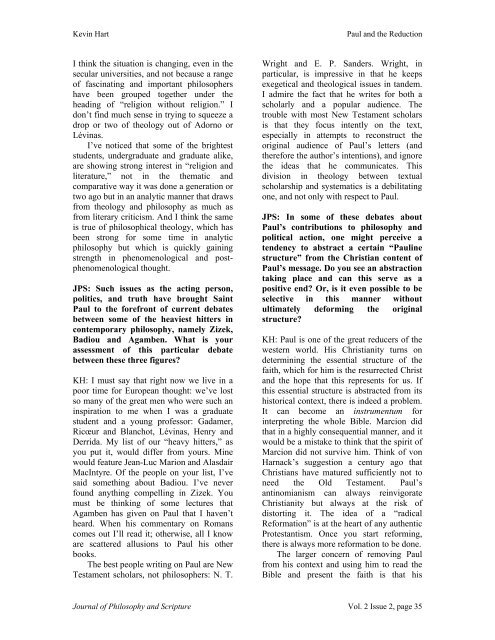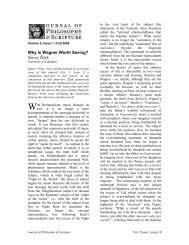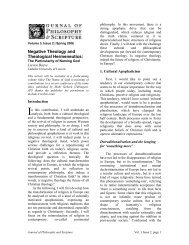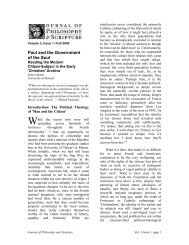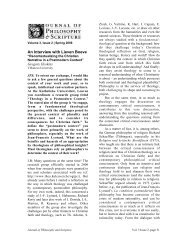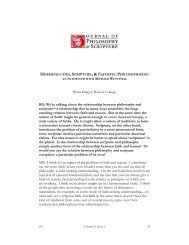An Interview with Kevin Hart - Journal of Philosophy and Scripture
An Interview with Kevin Hart - Journal of Philosophy and Scripture
An Interview with Kevin Hart - Journal of Philosophy and Scripture
You also want an ePaper? Increase the reach of your titles
YUMPU automatically turns print PDFs into web optimized ePapers that Google loves.
<strong>Kevin</strong> <strong>Hart</strong><br />
Paul <strong>and</strong> the Reduction<br />
I think the situation is changing, even in the<br />
secular universities, <strong>and</strong> not because a range<br />
<strong>of</strong> fascinating <strong>and</strong> important philosophers<br />
have been grouped together under the<br />
heading <strong>of</strong> “religion <strong>with</strong>out religion.” I<br />
don’t find much sense in trying to squeeze a<br />
drop or two <strong>of</strong> theology out <strong>of</strong> Adorno or<br />
Lévinas.<br />
I’ve noticed that some <strong>of</strong> the brightest<br />
students, undergraduate <strong>and</strong> graduate alike,<br />
are showing strong interest in “religion <strong>and</strong><br />
literature,” not in the thematic <strong>and</strong><br />
comparative way it was done a generation or<br />
two ago but in an analytic manner that draws<br />
from theology <strong>and</strong> philosophy as much as<br />
from literary criticism. <strong>An</strong>d I think the same<br />
is true <strong>of</strong> philosophical theology, which has<br />
been strong for some time in analytic<br />
philosophy but which is quickly gaining<br />
strength in phenomenological <strong>and</strong> postphenomenological<br />
thought.<br />
JPS: Such issues as the acting person,<br />
politics, <strong>and</strong> truth have brought Saint<br />
Paul to the forefront <strong>of</strong> current debates<br />
between some <strong>of</strong> the heaviest hitters in<br />
contemporary philosophy, namely Zizek,<br />
Badiou <strong>and</strong> Agamben. What is your<br />
assessment <strong>of</strong> this particular debate<br />
between these three figures?<br />
KH: I must say that right now we live in a<br />
poor time for European thought: we’ve lost<br />
so many <strong>of</strong> the great men who were such an<br />
inspiration to me when I was a graduate<br />
student <strong>and</strong> a young pr<strong>of</strong>essor: Gadamer,<br />
Ricœur <strong>and</strong> Blanchot, Lévinas, Henry <strong>and</strong><br />
Derrida. My list <strong>of</strong> our “heavy hitters,” as<br />
you put it, would differ from yours. Mine<br />
would feature Jean-Luc Marion <strong>and</strong> Alasdair<br />
MacIntyre. Of the people on your list, I’ve<br />
said something about Badiou. I’ve never<br />
found anything compelling in Zizek. You<br />
must be thinking <strong>of</strong> some lectures that<br />
Agamben has given on Paul that I haven’t<br />
heard. When his commentary on Romans<br />
comes out I’ll read it; otherwise, all I know<br />
are scattered allusions to Paul his other<br />
books.<br />
The best people writing on Paul are New<br />
Testament scholars, not philosophers: N. T.<br />
Wright <strong>and</strong> E. P. S<strong>and</strong>ers. Wright, in<br />
particular, is impressive in that he keeps<br />
exegetical <strong>and</strong> theological issues in t<strong>and</strong>em.<br />
I admire the fact that he writes for both a<br />
scholarly <strong>and</strong> a popular audience. The<br />
trouble <strong>with</strong> most New Testament scholars<br />
is that they focus intently on the text,<br />
especially in attempts to reconstruct the<br />
original audience <strong>of</strong> Paul’s letters (<strong>and</strong><br />
therefore the author’s intentions), <strong>and</strong> ignore<br />
the ideas that he communicates. This<br />
division in theology between textual<br />
scholarship <strong>and</strong> systematics is a debilitating<br />
one, <strong>and</strong> not only <strong>with</strong> respect to Paul.<br />
JPS: In some <strong>of</strong> these debates about<br />
Paul’s contributions to philosophy <strong>and</strong><br />
political action, one might perceive a<br />
tendency to abstract a certain “Pauline<br />
structure” from the Christian content <strong>of</strong><br />
Paul’s message. Do you see an abstraction<br />
taking place <strong>and</strong> can this serve as a<br />
positive end? Or, is it even possible to be<br />
selective in this manner <strong>with</strong>out<br />
ultimately deforming the original<br />
structure?<br />
KH: Paul is one <strong>of</strong> the great reducers <strong>of</strong> the<br />
western world. His Christianity turns on<br />
determining the essential structure <strong>of</strong> the<br />
faith, which for him is the resurrected Christ<br />
<strong>and</strong> the hope that this represents for us. If<br />
this essential structure is abstracted from its<br />
historical context, there is indeed a problem.<br />
It can become an instrumentum for<br />
interpreting the whole Bible. Marcion did<br />
that in a highly consequential manner, <strong>and</strong> it<br />
would be a mistake to think that the spirit <strong>of</strong><br />
Marcion did not survive him. Think <strong>of</strong> von<br />
Harnack’s suggestion a century ago that<br />
Christians have matured sufficiently not to<br />
need the Old Testament. Paul’s<br />
antinomianism can always reinvigorate<br />
Christianity but always at the risk <strong>of</strong><br />
distorting it. The idea <strong>of</strong> a “radical<br />
Reformation” is at the heart <strong>of</strong> any authentic<br />
Protestantism. Once you start reforming,<br />
there is always more reformation to be done.<br />
The larger concern <strong>of</strong> removing Paul<br />
from his context <strong>and</strong> using him to read the<br />
Bible <strong>and</strong> present the faith is that his<br />
<strong>Journal</strong> <strong>of</strong> <strong>Philosophy</strong> <strong>and</strong> <strong>Scripture</strong> Vol. 2 Issue 2, page 35


